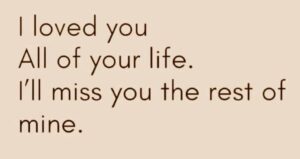We all say it and it’s not that I don’t believe it. Someone like me, who cut my preschool teeth on the doctrines of the church and has spent my entire life processing through the principles of my Biblical heritage, certainly believes the claims made by Christ himself and others in scripture:
“For God so loved the world that he gave his one and only Son, that whoever believes in him shall not perish but have eternal life.” John 3:16
For my Father’s will is that everyone who looks to the Son and believes in him shall have eternal life, and I will raise them up at the last day.” John 6:40
“For we know that if the earthly tent we live in is destroyed, we have a building from God, an eternal house in heaven, not built by human hands.“ 1 Corinthians 5:1
To the believing thief on the cross Jesus said, “Today you will be with me in paradise.” Luke 23:43
To all of us who believe we return to God when we leave here, to all of us who affirm, “To be absent in the body is to be present with the Lord” (2 Corinthians 5:8), we instinctively know those who die before us are in a better place.
The problem is they’re not HERE with us. Not anymore. Not ever again in this life. And that matters. A lot!
Mike’s absence created a falling domino effect of chaotic change, problems, logistics, emptiness, longing, yearning and loneliness, impossible to describe. A grief so deep and guttural I knew it could rip me apart.
I‘m not one to engage in comparisons of what is worse. Death is hard, for those left behind, regardless of how it comes. Maybe if he had been sick over a span of time, maybe if I had to watch him disintegrate through prolonged suffering I could say this platitude with more acceptance. But the brutal long goodbye was not my experience so I can’t know. We had no goodbyes at all. He was here. He was fine. Then in a moment he was gone.
Yes, undoubtedly he is in a better place. But while Mike is there, I’m not, and the knowing of this does not balance the scale of grief. However it occurs, our person being in a ‘better place’ is still that person gone for the rest of our life. What I do know, is that in the early raw days of his death, hearing this statement wasn’t comforting. At all.
What this statement repeatedly told me is Mike is doing great, he’s fine, but my loss, my pain, the fact that I am most certainly not in a better place without him didn’t matter. What I was suddenly up against, this tornado turn of events, felt unacknowledged and completely negated by reassurance that all was well for him, while everything that was normal and secure for me was spinning out of control.
Of course, there’s no intention of harm when we repeat these catch phrases in someone’s loss. Nothing I say here is meant to criticize only inform. Often we’re so uncomfortable in the stark reality of another’s grief, we feel the need to offer something and these Hallmark card sentiments are all we have.
The truth is there are no words to cheer up the reality of death and for certain nothing can ‘fix’ it. Nothing can begin to fill the void, replace the absence or replenish the emptiness. Nothing but acknowledgement of suffering and personal presence.
At times the overwhelming emotion and personal isolation of grief can also minimize these but with time (lots of it), patience, understanding, listening, hugs, prayer and practical help, we can validate and enter into another’s suffering.
“I’m so sorry, but I‘m here. I‘m with you. As much as I can be. For as long as you need,” is the best offering we can make.



Diane- You have learned so much from all the loss and change in your life. We are a society who likes to ‘fix everything’ including other people’s sadness and grief. You make many good points here in your article. I am a sociologist who studies death, dying, grief and bereavement. I am planning to present a proposal for a conference on this topic of griefisms. In my field, we examine the ‘isms’ and as I was trying to come up with ideas, I landed upon your site here. Would you be willing to talk with me about the possibility of working together on this project for a presentation next June in Wisconsin? I hope to hear back from you soon. Laurel
Dr. Laurel, So sorry with this late response. Here it is June and I’m just seeing your comment. I don’t visit my web site often unless I have something to publish. That is far and few between, unfortunately. Thank you for the invitation and considering my perspective. I think this is a topic that needs addressing in our grief illiterate culture.
I have taken note of all the “isms’ in response to my late husband’s sudden death and plan to write about them at some point. My situation is a bit different than most widows in that I am still caring for our adult intellectually disabled son on my own now. He can’t be left unsupervised so I have very limited freedom to travel or even leave my home unless someone is here with him. It’s been almost seven years and I feel like I’m just getting my bearings and finally adjusting to all my son and I lost when my husband died.
If I an be of any assistance outside of traveling I would Be willing to work with you. Please email me at Diane.connis@gmail.com if you’re still interested. I‘m going to check out your website just the same. Diane
What can I say? Your words have again pinpointed the sad truth of how jaded those left behind honestly feel. Thank you so much for having the courage and wisdom to articulate your thoughts in a very heartfelt and unique fashion. He should be here and that’s all there is to it, right?